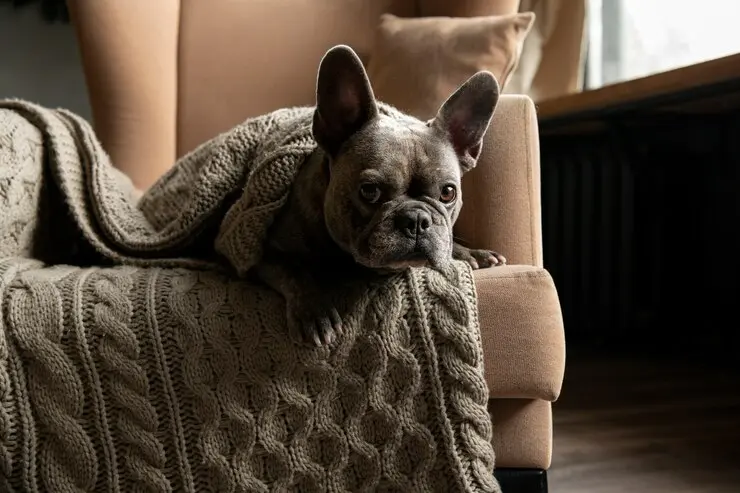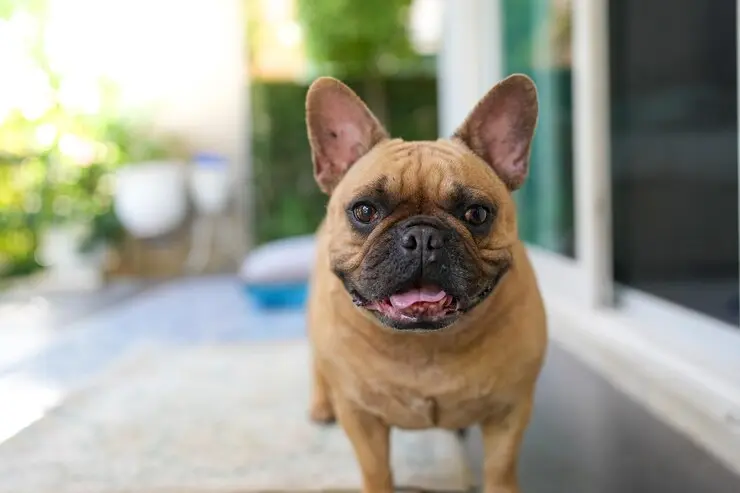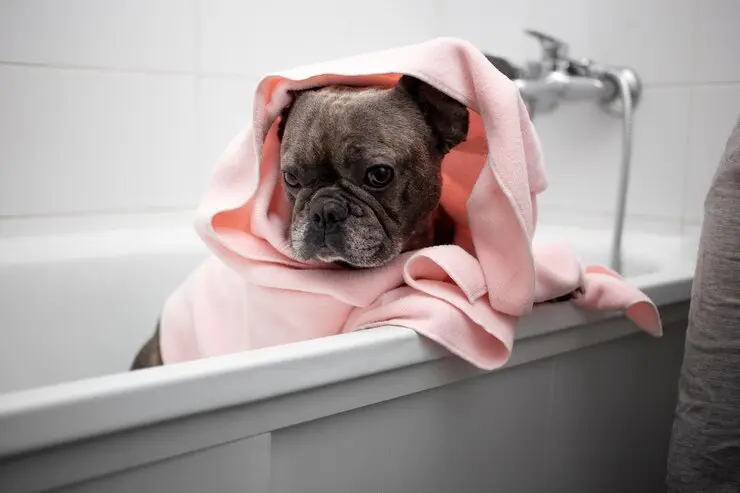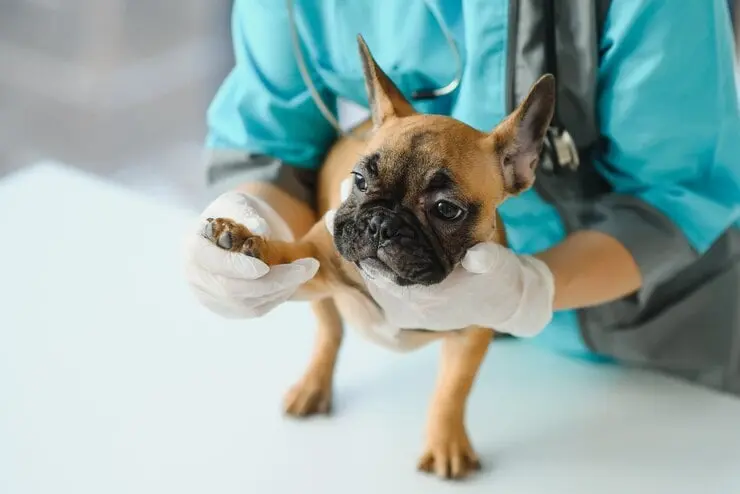How often do French Bulldogs fart?

Ever found yourself pondering how frequently your French Bulldog lets out a little toot? The burning question: “How often do French Bulldogs fart?”
“French Bulldogs might release gas a few times daily. Various factors, including diet, eating habits, and health, contribute to the occasional and endearing nature of their flatulence”
In this exploration of canine behavior, we’ll embark on a journey to understand the frequency of this amusing yet sometimes perplexing phenomenon. From the intricacies of their digestive systems to the various factors influencing their gas production, join us in unraveling the mystery behind the adorable, bat-eared companions and their not-so-silent expressions of digestive delight.
Get ready to delve into the world of French Bulldog flatulence and gain insights that will not only tickle your funny bone but also empower you as a responsible and informed pet owner.
Why Is My French bulldog Farting?

If your French Bulldog is emitting more gas than usual, several factors could be at play. Diet plays a crucial role; certain foods, especially those high in fiber or poorly digestible ingredients, can contribute to increased flatulence.
Additionally, swallowing air during meals or gulping food too quickly may lead to excess gas. Health considerations should also be explored, as underlying issues such as gastrointestinal problems or allergies can impact your Frenchie’s digestive system.
Observing and adjusting their diet, ensuring a balanced feeding routine, and seeking veterinary advice when necessary can help address and manage excessive farting, promoting a healthier and more comfortable experience for your beloved French Bulldog.
What else can cause French bulldog farting?
Beyond dietary factors, various elements can contribute to French Bulldog farting. Environmental stressors or sudden changes in routine can lead to digestive upset, resulting in increased flatulence. Inadequate hydration may also play a role, as it affects overall digestive health.
Intolerance to certain ingredients or allergens in treats, chews, or even household items could be a culprit. Furthermore, excessive swallowing of air during play or excitement may contribute to gassiness.
Regular monitoring, a well-balanced diet, proper hydration, and attention to environmental factors can help discern and address the diverse causes of French Bulldog farting, ensuring a content and gas-free furry companion.
Reasons Why French Bulldog Is Farting

French Bulldogs, with their endearing personalities and distinct physical traits, can occasionally surprise owners with their flatulence. While this behavior is normal to some extent, persistent or excessive farting may indicate underlying issues.
Let’s explore the various reasons why your French Bulldog might be letting out those toots:
- Air Swallowing: Aerophagia, or the unintentional swallowing of air during eating or drinking, is a common culprit for increased flatulence in French Bulldogs. This charming breed, with its endearing features, may inadvertently gulp down air, contributing to the symphony of canine gas.
- Physical Structure: The unique anatomical features of French Bulldogs, characterized by brachycephalic skulls and short noses, can impact their digestive processes and contribute to increased gas retention. Understanding these breed-specific traits sheds light on their susceptibility to flatulence.
- Disrupted Microbiome: A harmonious gut microbiome is crucial for proper digestion. Disruptions in this delicate balance can lead to increased flatulence. Probiotics, under the guidance of your veterinarian, can play a role in restoring a healthy bacterial equilibrium.
- High-Carb Diet: A diet rich in carbohydrates may contribute to flatulence as these macronutrients can ferment in the digestive system, releasing gases. Balancing the carbohydrate content in your French Bulldog’s diet is key to managing their digestive health.
- Dietary Transitions: Abrupt changes in your French Bulldog’s diet can unsettle their digestive balance, leading to increased flatulence. Gradual transitions between foods can minimize the risk of digestive upset and gas production.
- Economical Nutrition: Opting for budget-friendly, low-quality dog food may impact your French Bulldog’s digestive health, contributing to increased flatulence. Investing in a high-quality, well-balanced diet pays dividends in their overall well-being.
- Fiber-Heavy Diet: While fiber is essential for digestion, an excess can lead to increased gas production. Monitoring the types and amounts of fiber in your French Bulldog’s diet can help strike a balance for optimal digestive health.
- Health or Aging: Certain health conditions or the natural aging process can contribute to increased flatulence. Regular veterinary check-ups are essential for identifying and addressing any underlying health issues impacting your French Bulldog’s digestive comfort.
- Swift Consumption: French Bulldogs with a hearty appetite may devour their meals hastily, inadvertently swallowing air along with their food. Encouraging a more measured eating pace can minimize the introduction of excess air into the digestive system.
- Spoiled Nutrition: Feeding your furry friend expired or spoiled food is a surefire way to upset their digestive system, leading to increased flatulence. Regularly checking the freshness of their meals ensures optimal nutrition and digestive health.
- Allergic Reactions: Just like their human counterparts, French Bulldogs can develop allergies to certain ingredients in their diet. Allergic reactions may manifest as increased flatulence, signaling the need for a careful examination of their food components.
- Genetic Inclination: Some French Bulldogs may have a genetic predisposition to increased gas production. While genetic factors are beyond control, managing other contributing factors can help mitigate the frequency of flatulence.
- Hasty Eating: Rapid ingestion of food or water can introduce excess air into the digestive system, causing flatulence. Encouraging slower eating habits and using specialized bowls can mitigate this issue.
- Bowel Inflammation: Inflammation in the bowels, often associated with dietary sensitivities, can contribute to flatulence. Collaborating with your veterinarian is crucial for identifying and addressing potential inflammatory issues.
- Weight and Inactivity: Overweight French Bulldogs or those lacking regular exercise may experience sluggish digestion, leading to increased flatulence. Maintaining a healthy weight and ensuring adequate physical activity are vital for digestive well-being.
- Hard-to-Digest Nutrition: Certain ingredients in dog food may be challenging for French Bulldogs to digest, contributing to increased flatulence. Opting for easily digestible components promotes better digestive health.
- Human Food Scraps: While it’s tempting to share your meal with your French Bulldog, certain table scraps can cause digestive upset and increased flatulence. Be mindful of what you feed them from your plate.
- Intestinal Parasites: Internal parasites, including worms, can disrupt the digestive system and contribute to excessive gas production. Regular deworming and veterinary check-ups are crucial for preventing and addressing this concern.
Why does my French Bulldog have bad gas suddenly?

The sudden onset of bad gas in your French Bulldog can be attributed to various factors. Dietary changes, such as introducing new foods or treats, may lead to an imbalance in their digestive system, causing increased flatulence. Additionally, the consumption of poorly digestible or gas-inducing foods can contribute to sudden bouts of bad gas.
Health issues, like gastrointestinal problems or infections, could also play a role, warranting prompt attention from a veterinarian. It’s essential to consider recent alterations in their diet, monitor for any signs of distress, and seek professional advice if the issue persists.
Understanding the potential triggers and maintaining a balanced diet tailored to your French Bulldog’s specific needs can help alleviate sudden episodes of bad gas and promote their overall well-being.
How Much Gas Is Normal In French Bulldogs?
Determining what constitutes a normal amount of gas in French Bulldogs involves considering individual variations and overall health. While occasional flatulence is common in dogs, including French Bulldogs, excessive or persistent gas may indicate underlying issues.
Factors such as diet, exercise, and breed-specific traits can influence the frequency and volume of gas. On average, a French Bulldog may release gas a few times a day, but this can vary. It’s crucial for pet owners to establish a baseline for their Frenchie’s typical gas patterns and observe any deviations.
Consulting with a veterinarian is recommended if there’s a sudden increase in gas or if other symptoms of digestive discomfort arise, ensuring a proactive approach to their digestive health and overall well-being.
Foods that give French Bulldogs gas

Let’s uncover the food triggers causing your French Bulldog’s playful gas moments:
- Broccoli and Cauliflower
- Beans and Lentils
- Milk and Cheese
- Wheat and Corn
- Certain Meat Varieties
- Onion and Garlic
- Fruits and Sugary Treats
- Synthetic Additives
- Caffeine and Alcoholic Beverages
Why Do French Bulldogs Fart So Much?
Understanding why French Bulldogs tend to pass gas more frequently than other breeds involves a combination of their unique physiology, dietary choices, and individual factors. By exploring these aspects, owners can better appreciate the factors influencing their furry companion’s flatulence.
How to help a French bulldog deal with flatulence?

To help your French Bulldog cope with flatulence, focus on a mindful diet and lifestyle. Identify and eliminate potential gas triggers, introduce new foods gradually, and maintain a balanced, easily digestible diet.
Monitor portions, incorporate probiotics, and ensure regular exercise to promote a healthy digestive system. Consult with a veterinarian for personalized guidance and to address any underlying health concerns contributing to flatulence.
Unusually Loud, Smelly, or Excessive? Get It Checked
While occasional flatulence is normal, any deviation from the usual patterns should prompt a closer look. If your French Bulldog’s flatulence becomes unusually loud, emits an overpowering odor, or occurs excessively, it’s a signal to consult with a veterinarian.
These unusual characteristics could be indicative of digestive issues, dietary concerns, or underlying health problems. Veterinary professionals possess the expertise to conduct thorough examinations, identify potential causes, and recommend tailored solutions to ensure your Frenchie’s optimal health and comfort.
How to Treat Farting in French Bulldogs?

If your French Bulldog’s flatulence is causing concern or disruptions, implementing targeted treatments can enhance their overall well-being.
Nutrition
Dietary considerations play a pivotal role in managing flatulence in French Bulldogs. Opt for high-quality dog food that meets their nutritional needs without compromising on digestive health. Some dogs may benefit from specialized diets with limited ingredients or alternative protein sources, catering to specific dietary sensitivities.
Exercise
Regular exercise is a cornerstone of maintaining a healthy digestive system for French Bulldogs. Incorporate daily walks, playtime, and interactive activities to promote physical activity and stimulate proper digestion. Regular exercise not only aids in preventing excessive flatulence but also contributes to overall canine fitness.
Probiotics
Introducing probiotics to your French Bulldog’s diet can be a proactive measure to address digestive concerns. Probiotics promote a healthy balance of gut bacteria, aiding in digestion and minimizing gas-related issues. Consult with your veterinarian to choose a suitable probiotic supplement tailored to your Frenchie’s individual needs.
When to be concerned

While flatulence is a common occurrence, certain signs warrant closer attention and professional evaluation.
- Changes in Behavior: Observe your Frenchie for alterations in behavior, such as lethargy, unusual aggression, or signs of discomfort.
- Digestive Distress: Persistent symptoms like vomiting, diarrhea, or visible discomfort during bowel movements should be promptly addressed by a veterinarian.
- Unexplained Weight Loss: If your French Bulldog experiences unexplained weight loss despite a regular diet, it’s a signal to seek veterinary advice for a comprehensive examination.
- Consistent Odor or Sound Changes: If the character of the flatulence undergoes significant and consistent changes, such as a sudden increase in odor or volume, professional guidance is essential.
Frequently Asked Questions
How do I make my French Bulldog fart less?
- To minimize your French Bulldog’s flatulence, focus on their diet. Identify and eliminate gas-inducing foods, introduce new foods gradually, and ensure a well-balanced, easily digestible diet. Probiotics may aid digestion, and regular exercise promotes a healthy digestive system.
Can French Bulldogs be left alone?
- While French Bulldogs thrive on companionship, they can adapt to being left alone for reasonable periods. Ensure they have a comfortable space with toys and access to essentials. Gradually increase the duration of alone time, starting with short intervals, and consider a dog walker or pet sitter for longer absences.
How can I help my French Bulldog adjust to being left alone?
- Gradual desensitization is key. Start with short periods of alone time, gradually increasing duration. Create a positive association with alone time using treats and toys. Consider seeking professional advice if your Frenchie shows signs of distress.
Are there specific toys or activities to keep my French Bulldog entertained when left alone?
- Interactive toys, puzzle feeders, and toys that dispense treats can engage your Frenchie mentally and physically. Rotating toys and incorporating variety can help prevent boredom during alone time.
Should I be concerned if my French Bulldog farts a lot after meals?
- Occasional post-meal flatulence is normal, but excessive or persistent gas may indicate dietary issues. Monitor their diet, consider adjusting food portions, and consult with a vet if the problem persists.
Conclusion
In a nutshell, French Bulldogs occasionally let out toots, but understanding their quirky anatomy, dietary needs, and personal differences helps us take better care of them. By giving them the right food, playtime, and keeping an eye on their health, we can minimize unexpected gas moments. It’s about embracing their lovable quirks and creating a happy, healthy life together filled with laughter, even when the air gets a bit breezy.




